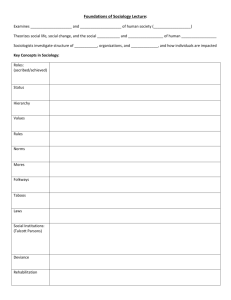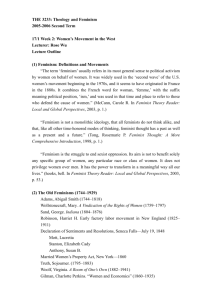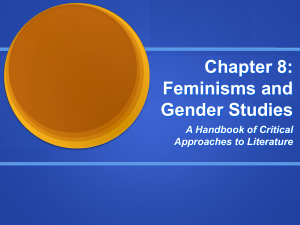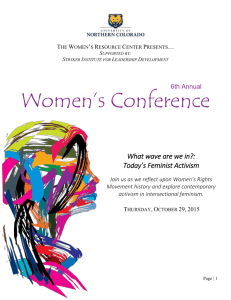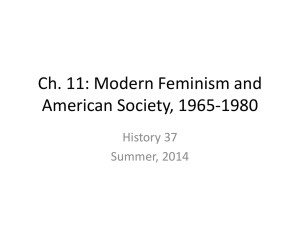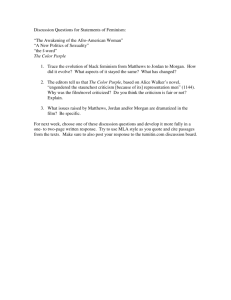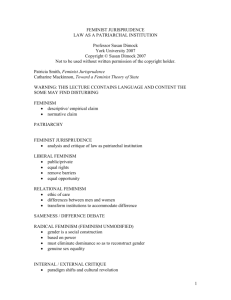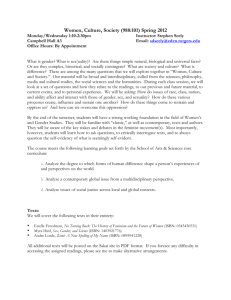Senior Seminar
advertisement
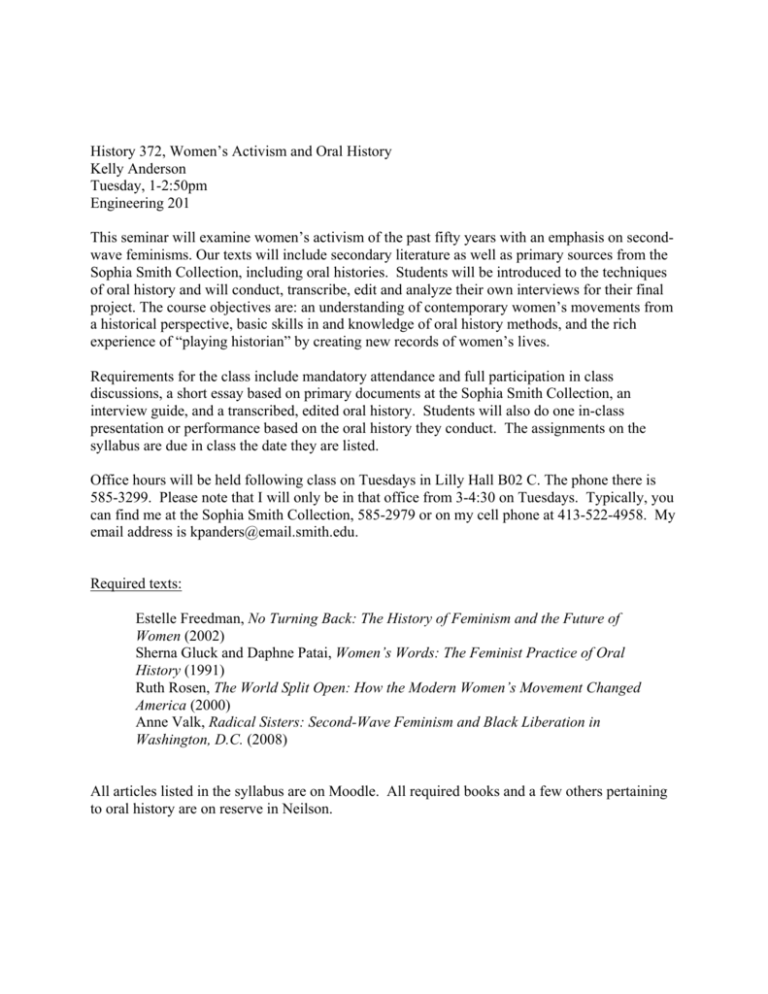
History 372, Women’s Activism and Oral History Kelly Anderson Tuesday, 1-2:50pm Engineering 201 This seminar will examine women’s activism of the past fifty years with an emphasis on secondwave feminisms. Our texts will include secondary literature as well as primary sources from the Sophia Smith Collection, including oral histories. Students will be introduced to the techniques of oral history and will conduct, transcribe, edit and analyze their own interviews for their final project. The course objectives are: an understanding of contemporary women’s movements from a historical perspective, basic skills in and knowledge of oral history methods, and the rich experience of “playing historian” by creating new records of women’s lives. Requirements for the class include mandatory attendance and full participation in class discussions, a short essay based on primary documents at the Sophia Smith Collection, an interview guide, and a transcribed, edited oral history. Students will also do one in-class presentation or performance based on the oral history they conduct. The assignments on the syllabus are due in class the date they are listed. Office hours will be held following class on Tuesdays in Lilly Hall B02 C. The phone there is 585-3299. Please note that I will only be in that office from 3-4:30 on Tuesdays. Typically, you can find me at the Sophia Smith Collection, 585-2979 or on my cell phone at 413-522-4958. My email address is kpanders@email.smith.edu. Required texts: Estelle Freedman, No Turning Back: The History of Feminism and the Future of Women (2002) Sherna Gluck and Daphne Patai, Women’s Words: The Feminist Practice of Oral History (1991) Ruth Rosen, The World Split Open: How the Modern Women’s Movement Changed America (2000) Anne Valk, Radical Sisters: Second-Wave Feminism and Black Liberation in Washington, D.C. (2008) All articles listed in the syllabus are on Moodle. All required books and a few others pertaining to oral history are on reserve in Neilson. September 9 Introduction September 16 Introduction to Feminisms Reading: Freedman, No Turning Back, Parts I and II Assignment #1: Take a look at We Don’t Need Another Wave, edited by Melody Berger (2006), and Sing, Whisper, Shout, Pray! edited by Jacqui Alexander (2003), both on reserve in Neilson. What do these authors and activists tell us about the current state of feminism? What caught your attention? Do these collections point toward avenues of historical inquiry for you? Assignment #2: I will divide you into groups and you will collectively be responsible for an inclass presentation and discussion facilitation on a section of the Freedman reading, either this week or next. September 23 Modern Feminisms Reading: Freedman, No Turning Back, Parts III, IV, V Assignment: I will divide you into groups and you will collectively be responsible for an inclass presentation and discussion facilitation on a section of the Freedman reading. September 30 Second-Wave Feminism in the U.S. Reading: Rosen, The World Split Open, pages xi-140 Film: Sisters of ‘77, by C. & A. Mondell (2005) October 7 Feminism and Black Liberation Reading: Valk, Radical Sisters Film: With A Vengeance, by Lori Hiris (1989) October 14 No Class October 21 Visit to the Sophia Smith Collection: Exploring Documents from Second-Wave Feminism October 28 Oral History Methodology and Camera Basics Reading: Michael Frisch, “Oral History, Documentary, and the Mystification of Power: A Critique of Vietnam: A Television History” from A Shared Authority Elizabeth Kennedy, “Telling Tales: Oral History and the Construction of Pre-Stonewall Lesbian Identity,” from A Queer World Alessandro Portelli, “What Makes Oral History Different,” from The Oral History Reader Donald Ritchie, “An Oral History of Our Time,” from Doing Oral History ** Short Essay Due ** November 4 What is Feminist Oral History? Reading: Gluck and Patai, Women’s Words, Intro and Chapters 1,2,3,9,13 Film: The Vagina Monologues, Eve Ensler (2002) VOF Clips Assignment: Visit the SSC and look at one of the Voices of Feminism oral histories (transcript and DVD.) Does the interview contribute to our understanding of feminist activism? Where does her story fit into the broader historical narrative? What are your thoughts on interview method or style? November 11 Interview Guides and Techniques Reading: Morrissey, “Oral History Interviews: From Inception to Closure,” from Handbook of Oral History Ritchie, “Conducting Interviews,” from Doing Oral History ** Interview Guide Due—email to class by Sunday, November 9 for review ** November 18 Trial Interviews Assignment: Video-record a short oral history on topics of feminism and/or activism with a friend or colleague on campus and report back to the class. What questions did you ask? How was your rapport? What could you improve on? Bring in a short video clip. November 25 Transcribing and Editing Reading: Fousekis, “Experiencing History: A Journey from Oral History to Performance,” from Remembering: Oral History Performance Mazé, “The Uneasy Page: Transcribing and Editing Oral History,” from Handbook of Oral History Film: Twilight, Los Angeles, Anna Deveare Smith (2004) December 2 Interview Report Back December 9 Presentations/Performances ** Oral History Transcript and Front Matter Due **

